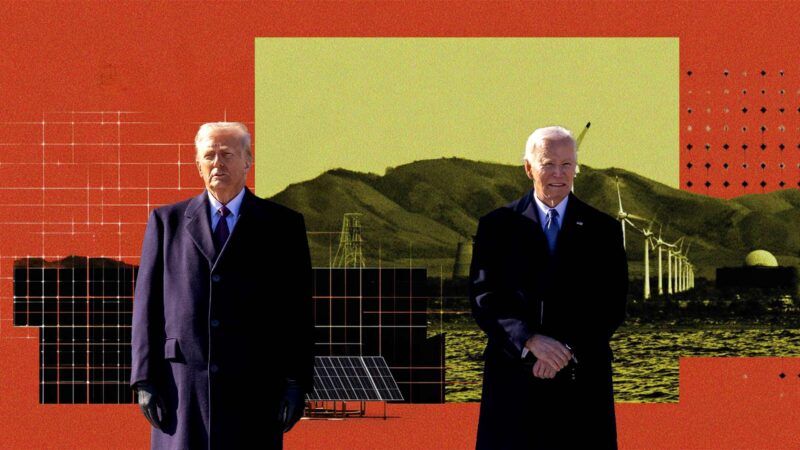The 'Big, Beautiful Bill' Keeps Most of Joe Biden's Energy Subsidies
While the bill may terminate subsidies for electric vehicles and energy efficiency, it falls short of fully eliminating government intervention in the energy sector.

The House of Representatives is fast-tracking the One Big Beautiful Bill Act, which passed the Senate on Tuesday. While lawmakers have attempted to hide the true cost of the bill with budgeting gimmicks, the bill is expected to add as much as $3.9 trillion to the federal deficit over the next decade and $270 billion next year alone.
While the bill's price tag should be enough for Congress to rebuff it, the carve-outs and subsidies of the legislation warrant a vote against the bill, especially its provisions for energy.
The Senate-passed version of the bill keeps tax credits for advanced nuclear power, geothermal, batteries, and hydropower that were passed in the Inflation Reduction (IRA) "for nearly a decade," reports Heatmap News. "The credits would start phasing down for projects that start construction in 2034 and terminate in 2036." Additionally, the Senate introduced a provision that will allow the coal used in steelmaking to qualify for federal tax credits. However, most of this coal is exported, so the bill will effectively subsidize other nations' steel industries, per Heatmap.
Wind and solar projects will also get a reprieve. The House-passed version of the bill eliminated subsidies for these sources beginning in 2028. While the Senate version would end these credits "abruptly with no phase-out period," according to Heatmap, it includes a stipulation that allows projects to cash in on these credits as long as they begin construction within a year of the bill's passage. Effectively, this will allow wind and solar projects to take advantage of IRA subsidies through 2030.
"It is incredibly easy to meet the standard of 'construction': all you have to do is commit 5% of expected project cost to buying re-sellable assets like solar panels," explains Alex Epstein, president of the Center for Industrial Progress, a pro-fossil fuel think tank. "Once you easily meet the standard of 'construction' you have a 4 year 'safe harbor,'" under the bill, "to be 'placed in service' and start collecting subsidies. Therefore a 'construction cutoff' of July 2026 is really a 'placed in service' cutoff of July 2030."
In short, the bill essentially gives lobbyists up to 10 years to preserve IRA subsidies, which are expected to cost $1.2 trillion over the next 10 years, according to the Cato Institute. In 2030, alone, these subsidies will cost $900 per taxpayer, and by 2050, the bill's subsidies could reach a $4.7 trillion price tag.
Just as the bill's cost has increased from its original projection ($271 billion over 10 years in 2021), its expected environmental benefits have decreased. The R Street Institute estimates that the IRA will reduce greenhouse gas emissions by 1.8 billion metric tons (3.1 billion metric tons originally). The bill's carbon dioxide (CO2) abatement costs have also risen from $336 per metric ton of CO2 at its passage to $600 per metric ton of CO2, according to R Street.
"From an environmental economics perspective, it is unlikely that IRA subsidies could carry enough environmental benefit to outweigh their cost to the public," reads the R Street report. "From a climate policy perspective, the subsidies are encouraging inefficient deployment of technologies rather than valuing emission abatement, leading to a relatively high-cost climate policy compared to alternatives," like permitting reform.
As it stands, Trump's "big, beautiful bill" will extend many of the provisions of former President Joe Biden's landmark climate legislation. While the bill may terminate subsidies for electric vehicles and residential energy efficiency, it falls short of fully eliminating government intervention in the energy sector.
Some members of Congress appear ready to vote against the legislation. If they do, lawmakers would have an opportunity to remove these harmful subsidies. If the bill passes, Americans will yet again be forced to finance politically favored energy projects.


Show Comments (6)